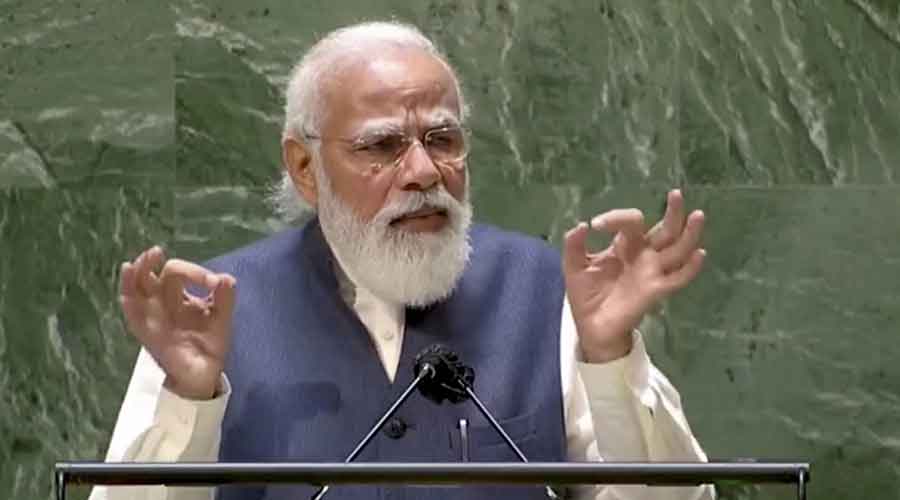Prime Minister Narendra Modi said on Saturday that countries with "regressive thinking" that are using terrorism as a "political tool" must understand that it is an equally big threat for them also, in a veiled attack on Pakistan which is often accused by its neighbours of providing safe havens to terrorists.
Addressing the 76th UN General Assembly here, Prime Minister Modi also said that in order to strengthen the rules-based world order, the international community must speak in unison, in an apparent reference to China which is flexing its military muscles in the Indo-Pacific.
Noting that the world is facing an increased threat of regressive thinking and extremism, Modi said countries that are using terrorism as a political tool have to understand that terrorism is an equally big threat to them.
"It is absolutely essential to ensure that Afghanistan's territory is not used to spread terrorism and for terrorist activities," he said. "We also need to ensure that no country tries to take advantage of the delicate situation in Afghanistan and use it for its own selfish interests."
Pakistan's neighbours, including Afghanistan and India, and the US have long accused Islamabad of providing safe haven and support to militants, a charge denied by it.
Modi said that oceans are also a shared heritage. "Our oceans are also the lifeline of international trade. We must protect them from the race for expansion. The international community must speak in one voice to strengthen a rule-based world order, he added.
Calling India the "Mother of Democracy", the Prime Minister Modi also showcased India's credentials as one of the world's oldest democracies and held out the example of how India's political system had empowered people and ensured "equitable development" for the country's masses.
"Yes, democracy can deliver. Yes, democracy has delivered," Prime Minister Modi said emphatically.
"The strength of our democracy is demonstrated by the fact that a little boy who used to help his father at a tea stall is addressing the UN General Assembly for the fourth time as Prime Minister of India," he said, citing his own example as he has often done in the past.
He began the speech by paying tributes to the large number of lives lost since 2019 to the global Covid pandemic.
The Prime Minister returned to the topic a short while after, citing India's ability to develop and manufacture vaccines and the setting up of the Co-WIN platform to streamline the country's ongoing nationwide inoculation drive.
He told the General Assembly that India had resumed the process of providing vaccines to those who need it in the world.
"I'd like to inform the UN General Assembly that India has developed the world's first DNA-based vaccine...Another is in the final stages of development. Indian scientists are also working on developing a nasal vaccine for coronavirus," he said.
"I extend my invitation to vaccine manufacturers from around the world: Come and make vaccines in India."
Earlier, stating how the world grows when India grows and how the "world transforms when India reforms", PM Modi listed other achievements of the country on the welfare front.
Inspired by the "Integral Humanism" philosophy of Deendayal Upadhyay, the ideological torchbearer of his party, the BJP, he said India was ensuring integrated and equitable development for all.
Extending his favourite slogan, "sabka saath, sabka vikas" ("With everyone, everyone's progress"), he said the country's priority was inclusive, universal development that "nurtures all".
"India has made homeless families home-owners...We are carrying out a campaign to ensure that piped clean water reaches homes...Drones are being used to map over 600,000 villages (to facilitate) digital land records...They reduce property disputes and increase access to credit and bank loans," PM Modi said, listing some of the projects being undertaken in India today










